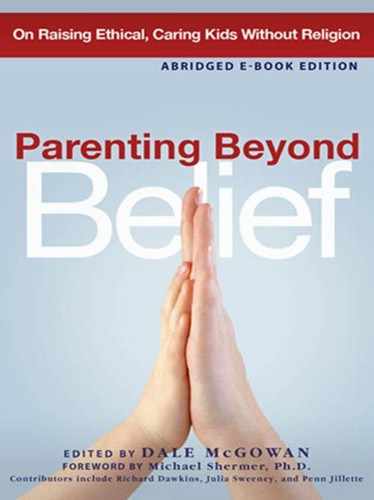Foreword
A License to Secular Parenthood
In the 1989 Ron Howard film Parenthood, the Keanu Reeves’ character, Tod Higgins, a wild-eyed young man trying to find his way in life after being raised by a single mom, bemoans to his future mother-in-law that you need a license to drive, have a dog, or even to fish—but they’ll let anyone be a father.
The “they” here is presumably the government, which has, despite its intrusion into just about every other aspect of our lives, thankfully stayed out of the parenting business. Nevertheless, the observation is a cogent one because when you become a parent there are no required courses on how to do it. I became a parent the same way just about everyone else has: by stumbling into it without any planning whatsoever. I hadn’t given it much thought until it happened. But when it did, I learned how to parent the same way as everyone else: on the job in real time. Fifteen years later I’m still learning.
I wish I could have had a book like Parenting Beyond Belief when I was starting out on this endless (and endlessly fulfilling) journey. It is choc-a-block full of advice, tips, suggestions, recommendations, anecdotes, and moving (and often funny) stories from a remarkably diverse range of authors who make you laugh and cry at the same time. This is the first book that I know of on parenting without religion. It is almost a given in our society that kids should be raised with religion, because if they aren’t, they will grow up to be juvenile delinquents, right? Wrong. Wronger than wrong. Not even wrong. The assumption is so bigoted and breathtakingly inane that it doesn’t deserve a debunking, but it gets one nonetheless in this volume, from nonbelievers of all stripes, who show how and why raising children without religion is not only a loving and ethical approach to parenthood, it is an honorable one.
My wife and I are raising our daughter, Devin, without religion. There was no conscious decision to do so, no formal plan. We don’t believe in God and so the subject just never comes up. Since I am a social scientist, I am well aware of the powerful influence parents can have on the religious, political, and social attitudes of their children, so if I took any proactive steps in the parenting of my daughter in this regard, it was not to be proactive in influencing her too strongly in any one direction. As I told her in a letter that I gave her on the occasion of her transitioning from middle school to high school:
Our beliefs about people, society, politics, economics, religion, and everything else are shaped by our parents and family, friends and peers, teachers and mentors, books and newspapers, television and the Internet, and culture at large. It is impossible for any of us to hold beliefs of any kind that are not significantly influenced by all these different sources. Up until about the age you are now—early teens—your beliefs have been primarily shaped by your parents. And since I am in the business of researching and writing about beliefs, as well as expressing them in public forums, I fear that my own rather strongly held beliefs may have had an undue influence on you; that is, my hope is that whatever it is you decide to believe about whatever subject, you have thought through carefully each of those beliefs and at least tried to make sure that they are your beliefs and not those of your parents. It matters less to me what your specific beliefs are than that you have carefully arrived at your beliefs through reason and evidence and thoughtful reflection.
We all do the best we can as parents, which was the central message of Parenthood, as evidenced in the scene where Steve Martin’s character, Gil Buckman, has a nightmare in which his son has grown up maladjusted and is now holed up in a college bell tower shooting students because his father messed him up by making him play second base. Gil’s plaintive plea—that he did the best he could—might be said by any parent. Here I am reminded of Robin Williams’ riff on parenting, in which he recalls two dreams: in one, his son proclaims “I’d like to thank the Nobel Academy for this great honor,” and in the other his son says “ya want fries with that?”
Nobel Prize or supersize fries—either way (or anything in between) I shall always love Devin and attempt to teach her the fundamental principles of a moral life. These principles are important whether there is a god or not, but especially if not. If this is all there is, and if there is no one out there keeping score, then parenthood is elevated to transcendency.
Michael Shermer
Michael Shermer is the Publisher of Skeptic magazine (www.skeptic.com), a monthly columnist for Scientific American, and the author of Why People Believe Weird Things, How We Believe, The Science of Good and Evil, and Why Darwin Matters.
